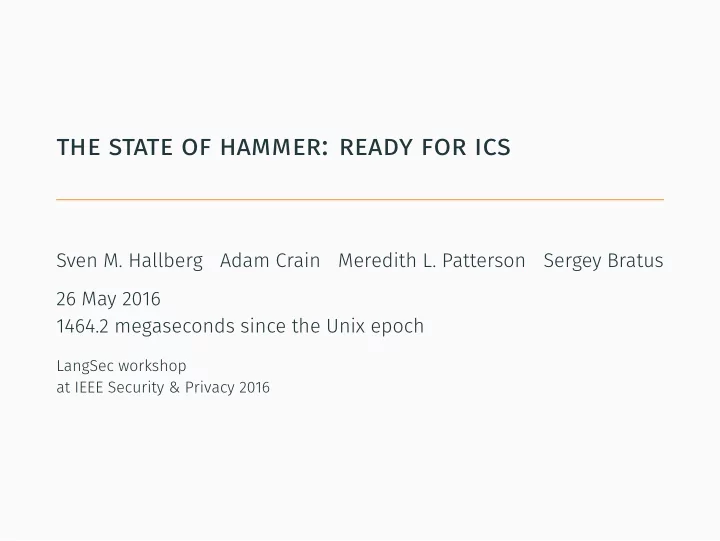

the state of hammer: ready for ics Sven M. Hallberg Adam Crain Meredith L. Patterson Sergey Bratus 26 May 2016 1464.2 megaseconds since the Unix epoch LangSec workshop at IEEE Security & Privacy 2016
recap: the hammer parser combinator library • Primitive parsers HParser *seqno = h_bits(4, false); HParser *bit = h_bits(1, false); ... • Combined to form higher-level structures • h_choice , h_many , h_many1 , … • define own combinators 1
spoiler Start with a grammar, stay with a grammar! But what is it? 2
dnp3 protocol layers 3
application layer AppHdr (ObjHdr Object*)* AppHdr = SeqNo Flags FunctionCode ObjHdr = Group Variation PC RSC Range Object = Prefix? ObjectData 4
problem? The previous fails to express dependencies between • Flags and FunctionCode • FunctionCode and ( Group , Variation ) • RSC , Range , PC • ( Group , Variation ) and Object s 5
a peek into the spec 6
complexity shifting • Syntax spills into "semantics". 7
complexity shifting (cont.) • Syntax spills… where?!? • "Obvious" constraints are not in spec 8
hammer example: dnp3 "select" function pcb = dnp3_p_g12v2_binoutcmd_pcb_oblock; pcm = dnp3_p_g12v3_binoutcmd_pcm_oblock; crob = dnp3_p_g12v1_binoutcmd_crob; anaout = dnp3_p_anaout_oblock; sel_pcb = h_sequence(pcb, h_many1(pcm), NULL); sel_oblock = h_choice(sel_pcb, crob, anaout, NULL); select = h_many(sel_oblock); 9
application: validating proxy 10
elfbac integration • ELFbac : Intra -process memory isolation based on ELF sections • Can also restrict access to system calls • "Behavioral access control" to capture programmer intent Only main loop may call OS Only OS may write to input buffer Only parser may read from input buffer Rest of application can read parse results 11
elfbac challenges • Application must be designed for separation • Normal malloc not (yet) captured • "Overcommit" makes custom heaps feasible • but memory accounting can still get in the way • we want to allocate address space • Hammer worked well with custom allocator • reusable 12
validation • Fine-grained unit tests ( lots of unit tests) • Tests for common DNP3 bugs • Valgrind • Fuzzing: AFL and Aegis • Different compilers 13
results "I survived American Fuzzy Lop" • length fields… • Directed tests: integer overflow • count fields… 14 • AFL: resource exhaustion in Hammer ( → fixed)
langsec as a roadmap Grammar is not everything but… it seems to help with everything . • Parsers naturally decompose for testing • Well-factored code is easier to maintain and extend • Decomposition helps separation of privileges 15
potential application issues • Speed impact • sequential tries vs. table lookups • CFGs are good! • Memory impact • generic data representation blows up packed structures • can we separate pure validation? 16
implementation challenges • EDSL (Hammer) learning curve • Difficult to debug • opaque stack traces • error messages?!? • Framework limitations? • allocator support • sync or async I/O • incremental processing 17
example stack trace 18
lessons • Learn a protocol's true syntax! • Don't shift language complexity out of parsing • Do isolate/capture complexity • Avoid lengths and counts, if possible • Use CFG parsing algorithms for network protocols (!) 19
end Code: github.com/pesco/dnp3 github.com/sergeybratus/proxy ELFbac: elfbac.org 19
dnp3 protocol layers • Application: AppHdr (ObjHdr Object*)* • Transport (think TCP): (SeqNo Flags Payload)+ • Link (think Ethernet): Header CRC (Payload CRC)*
hammer example: dnp3 "crob" object h_uint32(), dnp3_p_reserved(1), // 7 bits status, // off-time [ms] h_uint32(), // on-time [ms] // count h_sequence(h_bits(4, false), h_uint8(), tcc, // clear flag bit, // queue flag bit, // op type NULL));
apphdr in our parser (excerpt) h_choice(unsfc, rspfc, NULL)); h_sequence(rspac, rspfc, iin, NULL), H_RULE (rsp_header, h_choice(h_sequence(unsac, unsfc, iin, NULL), h_sequence(anyreqac, ereqfc, NULL), NULL)); h_sequence(reqac, reqfc, NULL), H_RULE (req_header, h_choice(h_sequence(conac, confc, NULL), h_right(h_and(h_not(anyrspfc)), fc)); H_ARULE(erspfc, h_right(h_and(h_not(anyreqfc)), fc)); H_ARULE(ereqfc, H_RULE (anyrspfc, H_RULE (confc, h_choice(confc, reqfc, NULL)); H_RULE (anyreqfc, h_choice(fc_rsp, fc_ar, NULL)); H_RULE (rspfc, h_choice(fc_ur, fc_ar, NULL)); H_RULE (unsfc, h_int_range(fc, 0x01, 0x21)); H_RULE (reqfc, dnp3_p_int_exact(fc, DNP3_CONFIRM)); h_sequence(anyrspac, erspfc, iin, NULL), NULL));
dnp3 could be context-free Obstacles: • Packet lengths • Object counts • Syntactic error handling • Complex header field relations
parsing variable-length data DNP3 link layer: Header CRC (Payload CRC)* • Generate parsers for CRC'ed blocks of size 1-16 • Extend to parsers for sizes 0-255 • Dispatch on length field to appropriate parser
Recommend
More recommend